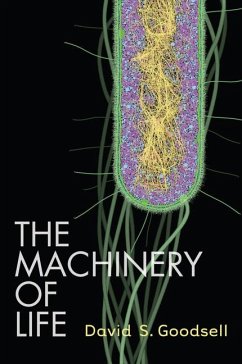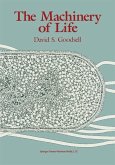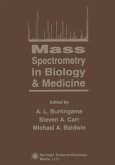Dieser Download kann aus rechtlichen Gründen nur mit Rechnungsadresse in A, B, BG, CY, CZ, D, DK, EW, E, FIN, F, GR, HR, H, IRL, I, LT, L, LR, M, NL, PL, P, R, S, SLO, SK ausgeliefert werden.
"The Machinery of Life is a journey into the sub-microscopic world of molecular machines. Readers are introduced to the types of molecules within the cell, including proteins, nucleic acids, lipids and polysaccharides. ... The Machinery of Life is a pictorial overview of the molecules that orchestrate the processes of life. ... The book provides a fascinating introduction to biochemistry and molecular biology for the non-specialists ... . It is written in clear, jargon-free text that is accessible to the lay reader." (Medical News Today, May, 2009)
"This book is amazing. ... this second edition is a major update. And what it conveys is the sheer unbelievable intricacy - and realness - of every cell in your body. David Goodsell ... accomplishes this via amazing full-color illustrations, paintings based on computer animations created from microscope images. ... It's slim, readable and engaging, a nonfiction book that calls to you fromthe nightstand table. If you are even a little curious about how cells work, get your hands on The Machinery of Life." (Lisa Parsons, The Hippo, July, 2009)
"The Machinery of Life, which is a new edition of Goodsell's 1993 book of the same name. ... the author's full-color illustrations are astonishing, forcing the reader to dwell for minutes on every picture. They are based on data from scientific papers, electron microscopy and information about molecular structures that were obtained by X-ray crystallography. ... He does a good job. ... Goodsell's technique is remarkable. He uses a combination of hand-drawing and computer graphics illustration." (Weanée Kimblewood, Lab Times, Issue 5, September, 2009)
"Anyone who finds biology, especially modern biology at the molecular level, quite baffling and bristling with incomprehensible jargon - this could be the book for you! ... David Goodsell is clearly a master of communication, conveying complex biological processes with great clarity. ... An excellent gift, then, for anyone interested in learning about biology in an enjoyable way. A book bursting with colour and genuinely difficult to put down ... ." (Michael Smith, Chemistry World, December, 2009)
"In science, true understanding comes with the ability to visualize the system. For students of cell and molecular biology, this visualization often comes in the form of diagrams simplified in the name of clarity. ... Using coordinates taken from the RCSB Protein Data Bank, Goodsell's wonderfully drawn illustrations are true to the scale and shape of the real molecules. ... This work will be enjoyed by all who are interested in the molecular processes ... from new students to experienced scientists. Summing Up: Highly recommended." (D. Carroll, Choice, Vol. 47 (4), December, 2009) "This well-written, beautifully illustrated volume serves as an introduction to the molecules that compose cells and viruses. The book is written at a very accessible level and is appropriate fornonspecialists and students beginning their study in biology. ... experienced biologists will appreciate the lucid treatment of complex concepts, particularly the idea of molecular crowding in cells. ... In summary, the easy-to-read narrative and beautiful illustrations of The Machinery of Life make this volume worthwhile to recommend to both nonspecialists as well as practicing biologists." (A. James Link, The Quarterly Review of Biology, Vol. 85 (1), March, 2010)









